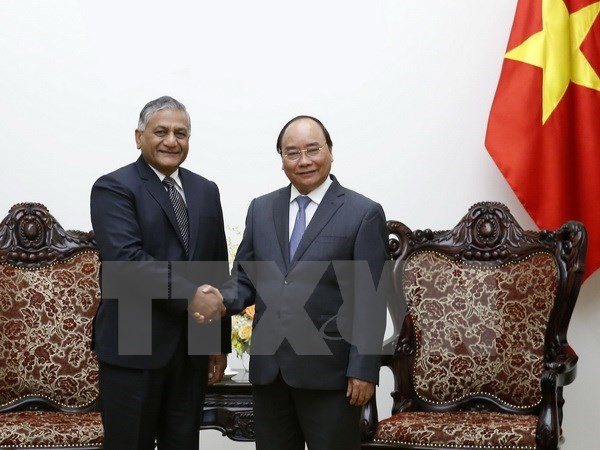Vietnam and India should bolster investment ties in areas of India’s strength and Vietnam’s demand, while minimizing and generally removing trade obstacles, Prime Minister Nguyen Xuan Phuc said to visiting Indian Secretary of State for External Affairs V.K.Singh.

Prime Minister Nguyen Xuan Phuc (R) and visiting Indian Secretary of State for External Affairs V.K.Singh
Meeting with Singh in Hanoi on April 21, PM Phuc expressed hope that two-way trade will reach 15 billion USD in 2020.
He noted that Vietnam and India have enjoyed sound traditional relations with strong mutual trust, lauding India’s goodwill in providing a preferential credit package to Vietnam for supporting the country’s development, as well as technical assistance in various fields of Vietnam’s demand.
Vietnam hopes that India will continue strengthening bilateral defence cooperation, the Government leader said, and affirmed that Vietnam supports India in continuing its oil and gas exploration and exploitation activities at sea.
He underscored that the two sides should foster connectivity in both road and aviation, while create optimal conditions for aviation service providers to open direct air route linking major political and economic centres of both countries.
Highlighting the importance of close coordination of the two countries at multilateral forums, the PM made clear that Vietnam supports India’s “Act East” policy and higher role and position in the region.
Vietnam supports India in strengthening connectivity and links with the ASEAN in all fields, he added.
PM Phuc also lauded the stance and positive statements of India regarding the East Sea issue over the past year, expressing his hope that India will continue raising its voice for peace, stability, maritime and aviation safety and security in the East Sea, upholding the respect for international law, including the 1982 UN Convention on the Law of the Sea as well as diplomatic and legal processes, and the settlement of disputes through peaceful methods in line with international law.
On his part, V.K Singh highly valued the sound relations between the two countries and the two government leaders.
He noted that this year, the two sides will celebrate their 45th anniversary of diplomatic ties and 25 years of the ASEAN-India dialogue partnership of which Vietnam plays the role of coordinator.
He underlined that the two countries should build roadmaps and specific plans to implement their comprehensive strategic partnership more effectively.
India is working hard to realise its commitment to provide a 500 million USD credit package to Vietnam, while strengthening affiliation with the country in cyber security, trade protection, defence personnel training, aerospace, and traditional medicine development, he noted.
He also pointed to strong potential in expanding bilateral partnership, and suggested that Vietnam and India should create favourable conditions for people-to –people exchanges through the opening of air routes, while developing maritime transport to serve trade.
Vietnam, India should early define cooperation directions to 2020: official
Vietnam and India should early sign an action programme on implementing the bilateral comprehensive strategic partnership, which was set up in 2016, thus defining orientations for bilateral cooperation in 2017-2020, Deputy Foreign Minister Bui Thanh Son said.
He made the request at a meeting on April 21 with India’s Minister of State for External Affairs Vijay Kumar Singh, who is on an official visit to Vietnam from April 20-23.
The Deputy FM said with the action programme, the two sides can reach measures for boosting cooperation in such prioritised areas as defence-security, trade and investment, energy, capacity building, technology transfer, and scientific research.
Son welcomed Vijay Kumar Singh’s visit to attend the first activities of the Vietnam-India Friendship Year 2017, which marks 45 years of the countries’ diplomatic ties (January 7, 1972) and 10 years of their strategic partnership (July 6, 2007).
Both sides noted with satisfaction the progress in their countries’ relations over the past four and a half decades, particularly the elevation of bilateral ties to a comprehensive strategic partnership during Indian Prime Minister Narendra Modi’s official visit to Vietnam in September last year.
They agreed that the foreign ministries will keep good coordination to organise major diplomatic activities in the Vietnam-India Friendship Year 2017, including delegation exchanges at all levels between the two States, Governments and parliaments, as well as between the people.
For his part, Minister of State Vijay Kumar Singh appreciated the contributions Vietnam has made as the coordinator of ASEAN-India relations for 2015-2018.
He noted Vietnam and India have made significant strides in bilateral ties as seen in the signing of important agreements in defence, atomic energy, cosmology, and information technology.
India will work with Vietnamese ministries and sectors to prepare for mutual high-ranking visits well and speed up the approval and disbursement of credit packages for Vietnam, he added.
The two sides agreed on the need to tap potentials and enhance economic, trade and investment partnership, striving to boost two-way trade to 15 billion USD by 2020. They urged the joint sub-committee on trade to convene as soon as possible to promote investment.
Vietnam welcomes Indian investment in energy, oil and gas exploitation, petro-chemistry, software development and IT training, textile and garment, and banking, Deputy FM Son said.
At the meeting, the two sides also exchanged viewpoints on regional and international issues of mutual concern. They were unanimous in maintaining coordination and mutual support at regional and international forums such as ASEAN-India cooperation, the Regional Comprehensive Economic Partnership (RCEP), and forums within the framework of the United Nations.
Regarding the East Sea issue, they reiterated the wish and determination to cooperate to maintain peace, stability, security, safety and freedom of navigation and aviation in the East Sea on the basis of international law, especially principles in the 1982 UN Convention on the Law of the Sea.
They underscored the importance of due respect for the Declaration on the Conduct of Parties in the East Sea (DOC), voicing the hope that relevant parties will soon reach a Code of Conduct (COC) in the waters.
VNA